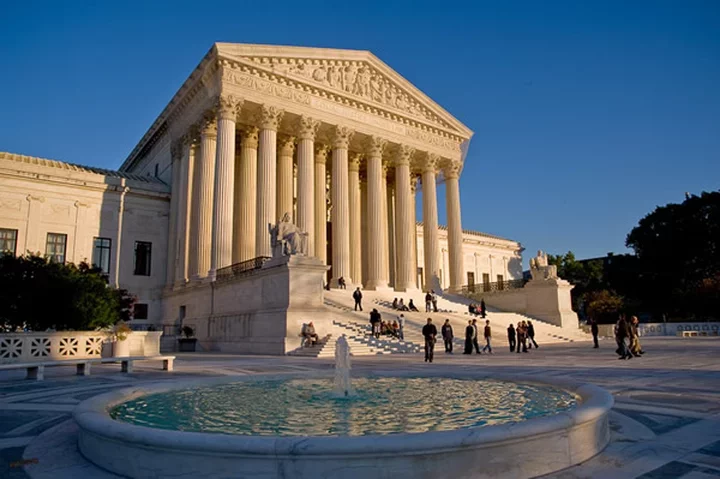UPDATE, 2:22 p.m.:
A county spokesperson emailed the following statement:
This is an important issue for the county; however, it is an ongoing legal matter, and we are committed to preserving the integrity of that process. For that reason, the county is unable to provide further comment on this subject to the press at this time.
###
Original post:
West façade of the Supreme Court Building. | Photo via the U.S. Supreme Court.
###
PREVIOUSLY
- Federal Judge Tosses Class Action Suit Challenging Humboldt County’s Cannabis Code Enforcement Process
- Appeals Court Reverses Dismissal of Class Action Suit Challenging Humboldt County’s Cannabis Abatement Penalties, Sending the Case Back to District Court
- Humboldt County Asks U.S. Supreme Court to Deny Review of Cannabis Fine Case
###
The U.S. Supreme Court today declined to hear a case arguing that Humboldt County landowners have a right to a jury trial when facing civil penalties for alleged violations of the county’s cannabis code.
In a statement that accompanies the petition’s denial, Justice Neil Gorsuch says that the case presented a poor vehicle to consider the fundamental constitutional question at issue: namely, whether the Seventh Amendment right to a jury trial should extend to state-level proceedings, including county code enforcement matters.
The case in question is Corrine Morgan Thomas, et al. v. Humboldt County, California, et al., a federal class action suit originally filed three years ago. The plaintiffs are a group of Southern Humboldt property owners, represented by the libertarian Institute for Justice , who allege that Humboldt County’s cannabis code enforcement practices are illegal. Specifically, their claim argues that the county levied exorbitant fines for alleged weed violations — in some cases by the prior owners of their properties — without giving them due process.
A federal judge dismissed the case in May 2023, noting, in part, that none of the plaintiffs had actually paid any of the proposed fines and that, furthermore, the county’s code enforcement regulatory framework “expressly provides for full-fledged judicial review after the conclusion of the administrative phase of the proceedings.”
However, a three-judge panel in the Ninth Circuit Court of Appeals overturned the dismissal late last year, finding that Humboldt County’s system of administrative penalties and fees may conceivably violate the Eighth Amendment’s prohibition on excessive fines.
While none of the plaintiffs have paid such fines, the appeals court found that the threatened penalties caused plaintiffs emotional and psychological distress, and that they had to spend money to abate and/or challenge the alleged violations. But the appeals court upheld the lower court’s dismissal of plaintiffs’ Seventh Amendment claim that they were deprived of a jury trial, citing as precedent the 1916 case of Minneapolis & St. Louis Railroad Company v. Bombolis, which holds that the Seventh Amendment’s right to a civil jury trial does not apply to state courts.
That precedent is exactly what the Institute for Justice was hoping to get overturned by the highest court in the land, and their petition garnered support from some heavy hitters on the political right, including the Cato Institute and the Buckeye Institute, both of which filed amicus briefs urging the Supreme Court to overturn Bombolis — as did Steven Calabresi, co-chairman of the Federalist Society, which has spent decades helping to pack the federal judiciary (including the Supreme Court itself) with right-wing appointees.
In a press release issued this morning, the Institute for Justice said its case will continue at the lower court level.
“The question of a civil jury trial was just one of the multiple ways that Humboldt’s code enforcement system violates the constitution,” the firm said.
Lead attorney Jared McClain added, “The Supreme Court’s decision not to take this case doesn’t change the fact that Humboldt’s scheme of crushing ordinary people under massive penalties for minor code issues is still unconstitutional—whether the fines are brought before a jury or not. We’ll continue fighting to stop it.”
Meanwhile, the Supreme Court may well be willing to overturn the Bombolis precedent if a better-suited challenge comes along. In his statement regarding the Humboldt case, Gorsuch describes that case as “something of a relic” and says its lingering presence on the books “not only leaves our law misshapen, it subjects ordinary Americans to a two-tiered system of justice.”
The Outpost reached out the the county this morning to request a response to the Supreme Court’s decision but has not yet heard back.
You can read Gorsuch’s statement on pages 18-21 of this document.

CLICK TO MANAGE